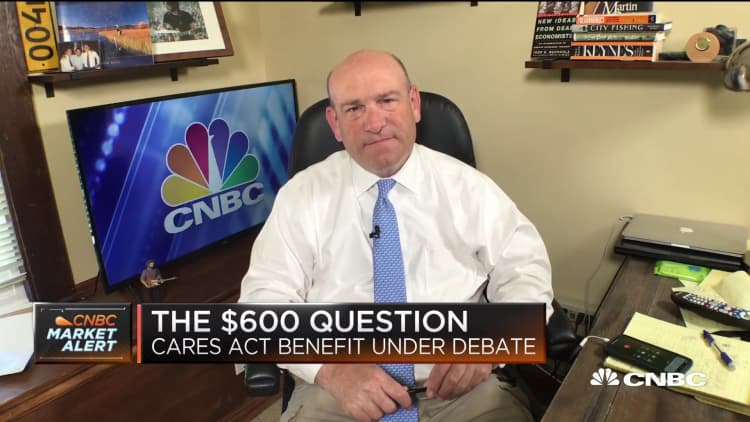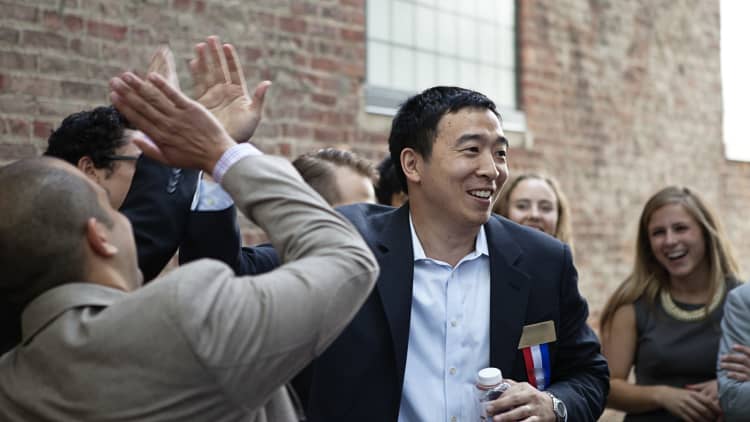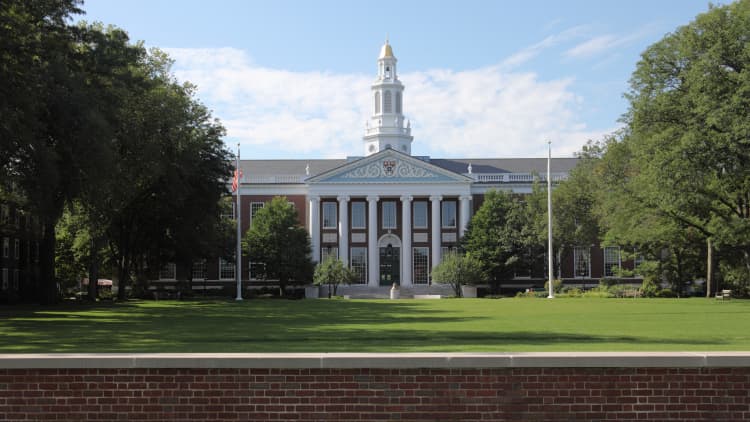A few years ago, Tomas Vargas, Jr., was having a tough time supporting his family.
The Stockton, California, resident, a part-time supervisor at UPS, found his paychecks were not enough to cover his expenses. To pick up extra cash, he looked for more work, by fixing cars and helping neighbors out around their houses.
"I was stressed out," Vargas, 36, said. "I was living paycheck by paycheck but I was having to hustle on top of it to get my bills paid."
Then, something changed. He was selected to participate in a new program offered by the city.
Called SEED, which stands for Stockton Economic Empowerment Demonstration, the program set out to give 125 city residents $500 per month for 18 months.
At first, Vargas said he thought it was a joke. Today, he says the money has made a real difference in his life.
Having the extra income enabled him to think about his future and find more meaningful full-time work. He could also spend more time with his family.

"The most important time is with your kids when they're young," Vargas said. "I got the opportunity to do that."
Stockton's experiment comes amid a national debate over how to give Americans more financial support. The coronavirus pandemic has prompted Congress to send millions of Americans $1,200 stimulus checks and give unemployed individuals an extra $600 per week to help limit the financial damage.
But that help is limited, while COVID-19 rages on. All eyes are on Congress to see whether they will send a second wave of stimulus checks and extend the extra $600 per month in unemployment benefits.
While some Republicans have called for reining in spending, some Democrats have suggested even more generous programs. One bill proposed by Sens. Kamala Harris, D-Calif.; Bernie Sanders, I-Vt.; and Ed Markey, D-Mass.; would send as much as $10,000 per month to American families for the duration of the pandemic.
People know what they need, and so it's just very efficient to deliver a cash payment.Elaine MaagSenior research associate, Urban Institute
The plan is a spin on universal basic income, whereby the government provides people with a guaranteed amount of money per month.
Stockton Mayor Michael Tubbs first learned of the concept as a student at Stanford University, when reading Dr. Martin Luther King Jr.'s book, "Where Do We Go From Here: Chaos or Community?" in which he calls for a basic income to help fight wealth inequality.
"I remember reading that as a college freshman and thinking, 'Wow, I had never heard this part of his legacy. I wonder what happened. Why was that not taught?'" Tubbs said.
Years later, Tubbs came upon the idea again in 2017, when he was elected mayor of Stockton, his home town. He asked his policy team to research ideas for programs to address various issues, and universal basic income popped up again.
"I think the crux of most of our issues in Stockton are poverty and systemic universal poverty," Tubbs said.
Putting something together required careful planning. As a first-year mayor, Tubbs said he knew the idea was politically risky.
In February 2019, SEED began sending $500 per month to 125 randomly selected residents.
The program was originally an 18-month experiment. However, it has been extended to 24 months, due to COVID-19 and through donations from philanthropist Carol Tonan. The last payments will be issued in January.
To qualify, residents must be 18 or over and live in a neighborhood at or below Stockton's median household income of $46,000.
There is no racial justice without economic justice. It's a key policy moment right now for guaranteed income.Sukhi SamraDirector, Stockton Economic Empowerment Demonstration
The program studies recipients with one key question in mind: How is guaranteed income impacting their income volatility?
Evidence points to a positive difference in the lives of the recipients, said Sukhi Samra, director of SEED.
Most are using the money for basic expenses which allows them to spend more time with their children, Samra said. One woman he cited was able to quit her second job as an Uber driver, which made her feel unsafe, but was forced to do to make ends meet.
Others have said they have less anxiety and stress, are sleeping better and have improved relationships with their spouses and children.

Critics say such programs are a handout for people who should work to earn more money.
"There's always the fear that we're going to give money to someone who doesn't deserve it," said Elaine Maag, senior research associate at the Urban Institute.
Yet other government programs might not provide support exactly where individuals and families most need it, she said.
"People know what they need, and so it's just very efficient to deliver a cash payment," Maag said.
SEED's goal goes beyond improving the lives of local recipients. It also strives to make the case for universal basic income on a national level.
To that end, the program is gathering data to compare people who are receiving the money to those who are not.
"Covid-19 has illustrated what we already intuitively knew to be true," Samra said. "The economy just isn't working for most working class Americans."
The movement also coincides with the racial protests taking place around the country.
"These conversations are inextricably linked. There is no racial justice without economic justice," Samra said. "It's a key policy moment right now for guaranteed income."
Tubbs said he is advocating for bigger adoption of the idea. To that end, he has spoken with House Speaker Nancy Pelosi, D-Calif., and almost every major Democratic presidential campaign.
In the meantime, more cities are making plans to implement similar programs.
Last month, 11 U.S. mayors including Tubbs formed a coalition called Mayors for a Guaranteed Income. They represent cities including Jackson, Miss.; St. Paul, Minn.; Newark, N.J.; Compton, Calif., Los Angeles and Oakland, Calif.; Shreveport, La.; Tacoma, Wash.; Columbia, S.C.; and Atlanta.
More from Personal Finance:
Fewer Americans may get a second stimulus check
This proposal would give as much as $10,000/month to American families
What unemployment benefits will look like without that extra $600 a week
Some mayors will initiate a program in their cities before the end of the year, while others are more tentative, Tubbs said. Together, they are advocating for the concept to be duplicated on a federal level.
"This is not Democrat or Republican. This is really an American thing," Tubbs said. "Hopefully with enough conversation, with enough mayors, we can push our federal friends to come together and put this in place for our residents."
For people like Vargas, the difference the extra income can make is tangible. But the program's benefits go beyond just money.
Earlier this year, Vargas' new job a local airport fell through due to COVID-19. But he was able to find a new one from a connection he made through the SEED program. Now, he works at a non-profit helping to educate young people who are about to become parents.
It's part of the positive example he promised he would set a decade ago, after attending 13 funerals in one year mostly due to street violence.
"It gives a lot of hope to people who have nothing at all," Vargas said of the SEED program. "Even the little bit they're doing now makes the biggest difference. I hope it gets bigger and helps other people out."

Correction: Nancy Pelosi is speaker of the House. An earlier version misstated her title.


